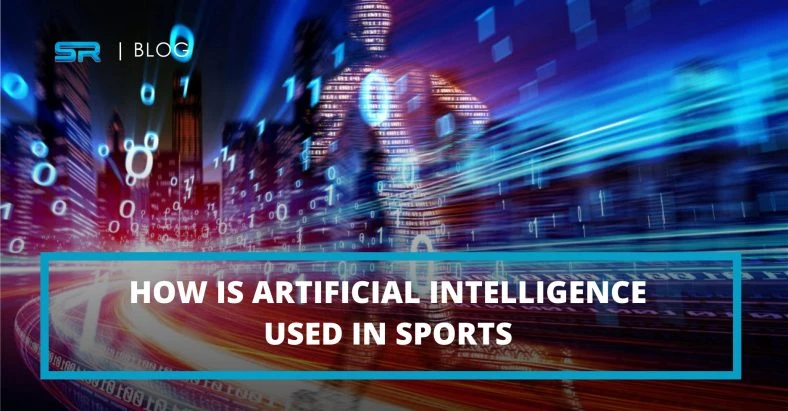How is Artificial Intelligence used in sports

The sports industry has been among the most profitable ones for several dozens of years. In the North American sports industry alone only spectator sports represent more than 1. 1 % of GDP. Technology has the potential to bring even more revenue to the industry, connecting spectators and players, popularizing new styles of sports, and making events accessible in new ways. Additionally, AI - powered applications can help teams and coaches to deliver better performance and track improvements. So, technology can create an impactful change in all sports areas, making the process more enjoyable for all participants.
Major Sports
The most profitable area of sports is major sports - the ones that are followed by billions of people all over the world - soccer, basketball, American football. Here, AI technology can make an impact on changing the nature of broadcasting, connect spectators to sports stars, and find interactive ways for people to participate in sports events.
Facebook chatbots
It's getting increasingly more common for football and basketball teams to create messenger bots that provide users with information on sports events, player updates, and create interactive inexperience. One of the first cases of successful use of chatbot was KAI - a chatbot of Sacramento Kings.
Mobile bots and applications
The National Hockey League ( NHL ) is leading the way in using Artificial Intelligence solutions to increase its engagement. Tampa Bay Lighting partnered virtual assistant company, Satisfi Labs. Together, they created a Thunder Bot - a mobile application that answers to fans, helps to buy tickets, gives parking insights, and informs the fanbase about new achievement. The bot increases convenience but also gives a personal touch to fans ' experiences.
Technology for safety in sports
Some sports are more dangerous than others - like car racing. No wonder that NASCAR is heavily investing in preventing crashes and deaths - each accident costs at least $ 300, 000 - and this is even without repair expenses. Ford partnered Argo Artificial Intelligence to develop a computer vision system for sports cars. If there is a chance of an accident, an AI - fueled application will predict a potential crash and quickly override the driver's actions with pre - installed security measures, leading to revenue improvements. Moreover, Ford reported that the application is superior to people in its capacity to identify other race cars and threats. Not only can it identify technical issues with a car before the race, but it also helps to get rid of small malfunctions in time and improve performance.
Applications for sports journalism and media sectors
In sports journalism, it's essential to communicate messages quickly and keep communications personal and relevant for every fan. Automated Insights is a startup that uses Artificial Intelligence to cover Minor League Baseball events. AI can write articles about the latest games, cover multiple leagues and teams, and aggregate information from all over the web. The startup reported an increase in profits in 12 times. AI in sports journalism is especially relevant because this type of reporting is heavily based on statistics and numbers. AI applications can automatically comply with reports, make predictions, and analyze players ' performance.
Wearable AI devices and applications
Wearing a device that measures the changes in the sportsman body provides players, coaches, journalists, and federations with valuable information on their health, efficiency, and methods. Here's how AI can deliver improvements.
Combat AI technology
Combat sports often face the problem of analyzing various microscopic techniques and movements, evaluating players ' performance, and detecting violations. Similarly, it's essential to track micro - injuries in time.
Applications equipped with biometric artificial intelligence solutions can contribute to the process. PIQ, a French startup, already created a wearable device and an app that detects boxing movements, helping to maximize the value of training sessions and improve performance. The startup proved its relevance to international investors - it raised 5. 5 million U. S. dollars in Series A.
AI - equipped sneakers
An Indian - based startup Boltt Sports Technologies works on AI wearable solutions and offers ' smart shoe ' connected with trackers and sensors that capture users ' data and supply the information to the app powered with AI. The application uses AI technology and Machine Learning to create recommendations for users. It can be used not only by professional players but by any person who's doing physical activities.
Potentially, such a solution could be a professional alternative to coaches, nutritionists, and doctors to people who can't afford regular consults with professionals. The application is on the testing stage now, but we will likely see more similar offers in the future.
Improving coaching practices
AI can be used by professional teams to improve their tactics, strategies, and game preparation methods. In Oregon State University, researchers already use AI to analyze NFL games and train devices to understand football strategies.
According to Alan Fern, the researcher in the university, AI technology can help to connect dots on conditions of each player, their moves, and connections between receivers and cornerbacks. Not only can AI applications calculate each player's ROIs, but also they are useful in grading the performance, and uncovering unnoticed by human coaches ' strategic depths.
AI - based ticketing
AI can potentially help fans to control their ticket purchases, change order details, and provide sports teams and their management with smart statistics on their sales. The San Francisco Deltas already tests AI in their quick ticketing application.
With such an application, the fan will know which section has the loudest supporters, where each player can be seen best, which seat is best for what purpose, etc. The ticket selling technology would go beyond the row and number of a seat, but connect to user needs on a profound level.
Sport broadcasting
Artificial Intelligence can change how spectators experience games and tournaments. AI applications can help companies to pick the best game moments better and faster, provide spectators with multiple perspectives and possibilities to switch between angles seamlessly. The AI technology can even adapt to users ' preferences, showing moments or players that a spectator wants to follow.
Tennis applications
In 2019, IBM analyzed the movements of tennis players during Wimbledon by using AI cognitive analysis and machine learning. The system also picked up the key moments in their actions and determined what had more broadcasting value.
Moreover, IBM applications also focused on statistics, picked the best crowd moments, and identified the rarest footage. Similar technology can be used in other sports as well, helping to create more valuable broadcasts.
Using computer vision to make decisions
Tennis has been the leading sport the way in adopting AI - based referees. Investors in Bay Area created a pocket device and application which allows analyzing any tennis shot in real - time. Such a device can be used in professional and amateur matches alike. The best thing is, tennis enthusiasts can also afford such a tool - it costs only $ 199.
Wrapping up : Are you ready for AI in sports ?
There is no doubt that Artificial Intelligence is impacting major, professional, and amateur sports and sports players. Spectators and participants on all levels can use smart insights, benefit from intelligent ticketing systems, and chatbots. AI applications will impact major sports first - it's the area that attracts investments and is attractive for tech leaders. Amateur sports is a standalone area - here we are likely to see the development of AI wearable devices, personal training assistants, and coaches. These changes won't concern only the North American sports industry, but federations and teams all over the world. AI will also change sports by impacting fields that are involved with sports - journalism, manufacturing ( cars ), ticket - selling services. In five more years, AI applications will likely penetrate most sports and all aspects of them, including high school athletic teams.

